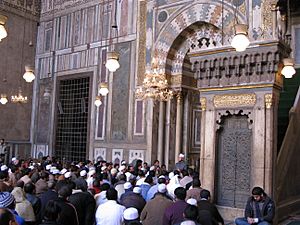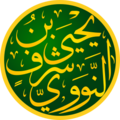Al-Nawawi facts for kids
Quick facts for kids Yaḥyā ibn Sharaf al-Nawawī |
|
|---|---|
 |
|
| Title | Imam |
| Born | Muharram 631 AH/ October 1233 Nawa, Ayyubid Sultanate |
| Died | 24 Rajab 676 AH / 21 December 1277 (age 45) Nawa, Mamluk Sultanate |
| Resting place | Nawa, present Syria |
| Occupation | Historiographer, bibliographer, scholar, jurist. |
| Religion | Islam |
| Denomination | Sunni |
| Creed | Ash'ari |
| Main interest(s) | Fiqh, Usul, Hadith, Mantiq |
| Arabic name | |
| Personal (Ism) | Yaḥyā |
| Patronymic (Nasab) | Ibn Sharaf ibn Marri ibn Ḥasan ibn Ḥusayn ibn Muḥammad ibn Jumah ibn Ḥazm |
| Teknonymic (Kunya) | Abū Zakariyyā |
| Toponymic (Nisba) | al-Nawawī |
Abū Zakariyyā Yaḥyā ibn Sharaf al-Nawawī (1233–1277), often called al-Nawawī or Imam Nawawī, was a very important Islamic scholar. He was a Sunni Muslim who followed the Shafi'i way of understanding Islamic law. He was also an expert in hadith, which are sayings and actions of Prophet Muhammad.
Al-Nawawi wrote many books. These books covered topics like hadith, Islamic beliefs, biographies, and Islamic law. He never married and dedicated his life to learning and teaching.
Contents
Early Life and Education
Growing Up in Nawa
Al-Nawawi was born in a town called Nawa in Syria, near Damascus. Like many Arabic names, the last part of his name, "al-Nawawī," tells us where he came from.
Even as a young boy, Al-Nawawi loved learning. A man named Yasin bin Yusuf Marakashi saw him when he was about ten years old. While other boys played, young Nawawi preferred to read the Noble Qur'an. He would even cry if others tried to make him join their games. Yasin bin Yusuf Marakashi was so impressed that he told Nawawi's teacher to take special care of him. He believed Nawawi would become a great religious scholar. The teacher told Nawawi's father, who then decided to support his son's path to becoming a scholar of Islam.
Studying in Damascus
Nawa did not have many places for advanced religious learning. So, Al-Nawawi's father took him to Damascus. At that time, Damascus was a major center for learning. It had many schools and universities.
Imam Nawawi joined a school called Madrasah Rawahiyah. This school was connected to the Ummvi University. He studied there for two years. During this time, he worked incredibly hard. He often slept very little at night. If he felt too tired, he would lean against his books and rest for a short while before continuing his studies.
Life as a Scholar
Al-Nawawi began studying in Damascus when he was 18. After going on a pilgrimage in 1253, he decided to stay in Damascus and become a private scholar. This meant he taught and wrote without being tied to a specific institution.
His Teachers
During his time in Damascus, Al-Nawawi learned from more than twenty teachers. These teachers were experts in their fields. He studied many subjects, including Hadith, Islamic Law, and the rules of Arabic grammar. Some of his notable teachers included Abu Ibrahim Ishaq bin Ahmad AI-Maghribi and Abu Muhammad Abdur-Rahman bin Ibrahim Al-Fazari.
His Beliefs
Al-Nawawi believed that Allah is unique and unlike anything in creation. He explained some verses of the Qur'an and hadiths that describe Allah's attributes. He taught that these descriptions should be understood in a way that fits Allah's greatness. For example, when a hadith mentions Allah being "in the sky," he explained it means Allah is the one who is called upon when people pray facing the sky, just as people face the Kaaba when they pray. This shows that Allah is the only Creator and Controller.
Standing Up to Power
Al-Nawawi was not afraid to speak the truth, even to powerful rulers. He once challenged the Mamluk Sultan Rukn al-Din Baybars. This happened when the people of Damascus were suffering from high taxes during a long drought. Al-Nawawi asked the Sultan to reduce these heavy taxes.
Sultan Baybars was angry and threatened to make Al-Nawawi leave Damascus. But Al-Nawawi bravely replied: "Threats do not harm me or mean anything to me. They will not stop me from advising the ruler, because I believe this is my duty."
Death and Lasting Impact
Al-Nawawi passed away in Nawa when he was only 44 years old.
Al-Nawawi's most important legacy is his work on hadith literature. His two most famous books are Forty Hadiths and Riyadh as-Saaliheen. These books are respected by Muslims from all different schools of thought. He was known for his deep focus on learning. He spent all his time reading, writing, and thinking about difficult issues to find solutions.
Sheikh Mohiuddin, another scholar, described Imam Nawawi's special qualities: "Imaam an-Nawawi had three amazing qualities. If someone has just one of these, people seek their guidance. First, he had great knowledge and shared it. Second, he completely avoided worldly desires. Third, he always encouraged good deeds and stopped bad ones. Imaam an-Nawawi had all three of these qualities."
His Tomb
Sadly, in 2015, during the Syrian Civil War, Al-Nawawi's tomb was damaged by some rebel groups.
His Works
Even though he lived only 45 years, Al-Nawawi wrote at least fifty books on Islamic studies and other topics. Some of his important works include:
- Al Minhaj bi Sharh Sahih Muslim: This is a famous commentary on the book Sahih Muslim, which is a collection of hadith.
- Riyadh as-Saaliheen: This popular book is a collection of hadith about good manners, ethics, and how Muslims should behave.
- al-Majmu' sharh al-Muhadhab: A detailed guide to Islamic law according to the Shafi'i school.
- Minhaj al-Talibin: Another important book on Islamic Law for the Shafi'i school.
- Tahdhib al-Asma wa'l-Lughat: A biographical dictionary of famous Muslim men.
- Taqrib al-Taisir: An introduction to studying hadith.
- al-Arbaʿīn al-Nawawiyya ('Forty Hadiths'): A collection of forty-two very important hadith. This book is widely read and studied.
- Kitab al-Adhkar: A collection of prayers and supplications from Prophet Muhammad.
- al-Tibyan fi adab Hamalat al-Quran: A book about the manners of those who carry (memorize or teach) the Qur'an.
- Manasik: A guide to the rituals of Hajj, the pilgrimage to Mecca.
Recent English Language Editions
Minhaj al-Talibin
- Minhaj et talibin: A Manual of Muhammadan Law ; According To The School of Shafi, Law Publishing Co (1977) ISBN: B0006D2W9I
- Minhaj et talibin: A Manual of Muhammadan Law ; According To The School of Shafi, Navrang (1992) ISBN: 81-7013-097-2
- Minhaj Et Talibin: A Manual of Muhammadan Law, Adam Publishers (2005) ISBN: 81-7435-249-X
The Forty Hadith
- Al-Nawawi Forty Hadiths and Commentary; Translated by Arabic Virtual Translation Center; (2010) ISBN: 978-1-4563-6735-0
- Ibn-Daqiq's Commentary on the Nawawi Forty Hadiths; Translated by Arabic Virtual Translation Center; (2011) ISBN: 1-4565-8325-5
- The Compendium of Knowledge and Wisdom; Translation of Jami' Uloom wal-Hikam by Ibn Rajab al-Hanbali translated by Abdassamad Clarke, Turath Publishing (2007) ISBN: 0-9547380-2-0
- Al-Nawawi's Forty Hadith, Translated by Ezzeddin Ibrahim, Islamic Texts Society; New edition (1997) ISBN: 0-946621-65-9
- The Forty Hadith of al-Imam al-Nawawi, Abul-Qasim Publishing House (1999) ISBN: 9960-792-76-5
- The Complete Forty Hadith, Ta-Ha Publishers (2000) ISBN: 1-84200-013-6
- The Arba'een 40 Ahadith of Imam Nawawi with Commentary, Darul Ishaat
- Commentary on the Forty Hadith of Al-Nawawi (3 Vols.), by Jamaal Al-Din M. Zarabozo, Al-Basheer (1999) ISBN: 1-891540-04-1
Riyad al-Salihin
- Gardens of the righteous: Riyadh as-Salihin of Imam Nawawi, Rowman and Littlefield (1975) ISBN: 0-87471-650-0
- Riyad-us-Salihin: Garden of the Righteous, Dar Al-Kotob Al-Ilmiyah
- Riyadh-us-Saliheen (Vol. 1&2 in One Book) (Arabic-English) Dar Ahya Us-Sunnah Al Nabawiya
See also
 In Spanish: Al-Nawawi para niños
In Spanish: Al-Nawawi para niños
Images for kids
 | James Van Der Zee |
 | Alma Thomas |
 | Ellis Wilson |
 | Margaret Taylor-Burroughs |



